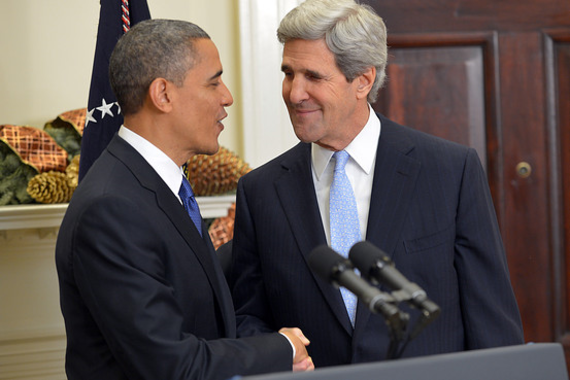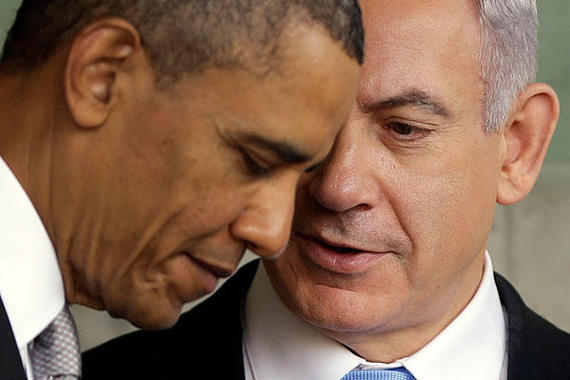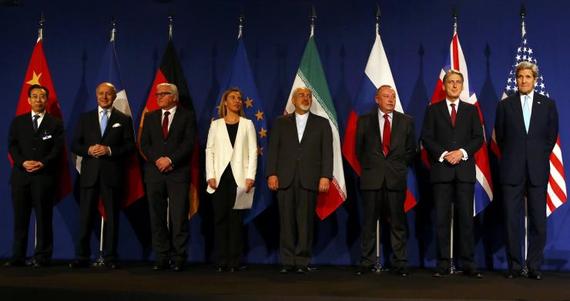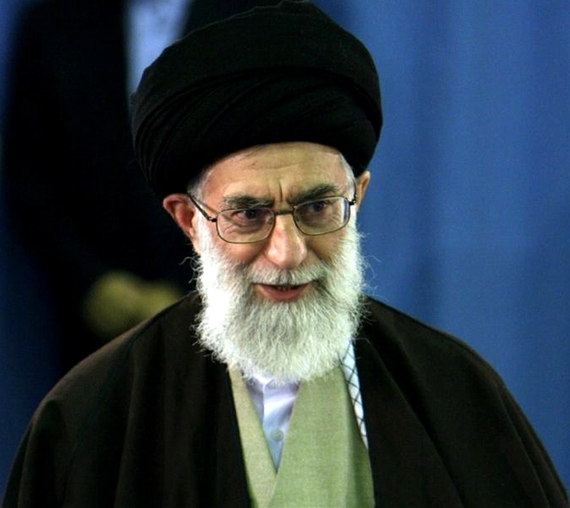Question: Why is Obama's Mideast policy like a donut?Answer: Because for all its substances it lacks a center.
The Middle East continues to move toward ever increasing levels of violence and chaos. To be sure it was never that stable of a place to begin with. Nor would it be fair to entirely blame the Obama administration for the current, spreading disorder in the region. That responsibility can be levied on a long stream of actors, beginning with the ill-conceived Anglo-French Sykes Picot agreement almost a century ago, down to a succession of American presidents on both sides of the political aisle.
Nonetheless, there is little doubt that the Mideast region today is far less stable than it was six years ago when the Obama administration came to power. While not all of the current problems gripping the region are necessarily the White House's doing, the responsibility for a poorly defined, often contradictory foreign policy that has resulted in a marked decline of American influence there, and a growing unease about the reliability of the United States as a partner, must be squarely placed at the President's door step.
The core of America's foreign policy in the Middle East has historically rested on two principles. First, to insure that the region's oil flowed smoothly to the industrialized world and that no regional hegemon would emerge to either disrupt the petroleum supply chain or be able to consolidate control of a disproportionate share of the region's oil reserves. The second principal was a de-escalation, to the extent possible, of the conflict between Israel and its Arab neighbors.
Over the course of the last four decades successive administrations have adhered to these dual goals, both in their stated policies and in their actions. Saddam Hussein's invasion of Kuwait was successfully reversed by a coalition of nations under American leadership. Iranian attempts to project its military power into the Gulf in general, and to threaten closure of the straits of Hormuz in particular, were repeatedly rebuffed by the American military presence there. In addition, American security guarantees and the availability of advanced American weaponry was the bedrock of Saudi and the Emirates' security.
The conflict between Israel and its neighbors, a conflict that had seen Israel go to war with Egypt, Jordan, and Syria on four separate occasions between 1948 and 1973, was significantly de-escalated. Under American sponsorship, Israel signed peace treaties with Egypt and Jordan. A de facto, unofficial armistice, was also reached between Israel and Syria.
To be sure that was not the end of conflict in the region. Despite a number of "peace agreements" between the Palestinians and Israel, a lasting settlement has yet to be reached. A fact underscored by two Palestinian Intifadas, with a prospect of a third one on the verge of beginning, and ongoing "terrorist" attacks.
Additionally, a range of non-state actors, usually supported by outside powers, continued a campaign of low intensity violence. Lebanon, and to a lesser extent Gaza, became arenas for an ongoing proxy war, first between Israel and Syrian proxies, and then between Israel and Iranian proxies. While these conflicts created a climate of violence and were burdensome to Israel, they did not pose an existential threat.
In order to carry out its foreign policy objectives, the United States, historically, has relied on two principal strategies. The first was the maintenance of the U.S. supported, de facto, Cairo-Jerusalem-Amman axis that served to stabilize Israel's eastern and western borders as well as to isolate Syria and preclude the resumption of another Mideast war.
The second principal strategy of American foreign policy in the region was the alliance with Saudi Arabia (i.e. the house of Saud) and its Gulf allies. Initially that alliance was designed to protect the Gulf oil producers from Soviet threats or those of their proxies (Iraq), but since 2003 the focus has been on containing Iranian expansionism and its attempts to destabilize its Arab neighbors in the Gulf.
Today, the credibility of America's Middle East policy has been severely damaged by a White House whose Mideast strategy can best be described as unclear, inconsistent, and lacking follow-through.
The Obama Administration disapproved of the Egyptian Army's coup against President Mohammed Morsi, even though Morsi was taking Egypt in a direction that most Egyptians disagreed with and which would have ultimately been inimical to American interests in the Middle East. In response the White House suspended much of its military aid to Egypt and eliminated most high level contacts with the government of General Abdel Fattah el-Sisi.
That same White House has gone out of its way to snub the government of Israeli Prime Minister Netanyahu. The most recent example, just a few weeks ago, when, contrary to historic practice, the most senior members of the Administration's foreign policy team were visibly absent during Netanyahu's address to the U. N. General Assembly. Both National Security Advisor Susan Rice and Secretary of State John Kerry were "busy" and could not attend.
Fortunately, we still seem to get along with the Jordanian government. Apparently they have not given the White House any reason to be irritated with them.
What exactly do we gain by snubbing long-standing allies in the region beyond raising questions about the reliability of our commitments to those countries? Do we really want Morsi back in charge in Cairo? Do we think that publically snubbing the Israeli government will garner good will towards the United States elsewhere in the Middle East? Officially we have not changed our policies toward either Israel or Egypt, we've just gone out of our way to make it clear that we don't like either government.
With the situation in Libya spiraling out of control and threatening to spillover violence into its neighbors, plus the rise of Islamic State affiliated groups in the Sinai, we have now moved to restore military aid and high-level contacts between the American and Egyptian governments. We should never have suspended them in the first place.
Fortunately, the Cairo-Jerusalem-Amman axis is still holding. There is little prospect that these three countries might find themselves in a war again anytime soon. On the other hand in eroding our relationship with Egypt we have opened the door for Russia to try to exert more influence there. Not surprising, the Kremlin has been quick to jump at the opportunity to strengthen its ties to Egypt.
The record in Syria has been equally inconsistent. Initially the White House condemned the Assad government for its brutality and insisted Assad would have to go. The President was clear that if Damascus used chemical weapons against its own civilian population, that "would be a red line" and that there would be "repercussions." Assad used chemical weapons and the Obama administration looked the other way.
Later, with mounting evidence that the air campaign against the Islamic State (IS) in Syria was failing to arrest the spread of IS, Secretary of State John Kerry began to drop hints that the White House might be able to live with Assad continuing in power. In the meantime we continued a lackluster air campaign against Islamic State militants in Syria that barely saw three or four sorties a day and was carried out under such strict rules of engagement that barely one in four missions actually engaged Islamic State targets.
Russia has now intervened in the Syrian Civil War; deploying two squadrons of advanced Sukhoi fighter jets and is supporting the Syrian Army's ground offensive against rebel groups that the U.S. was ostensibly supporting. At the same time, the Kremlin has been reaching out to the Kurds and to other groups in Syria in an attempt to craft a political solution that would see Assad stay in power under a "federal" power sharing system that would include all but the most radical Islamist elements or the Islamic state. In the process Russian President Vladimir Putin has succeeded in making the White House appear to be largely irrelevant to the future of Syria.
We did support the Syrian Kurds. With the benefit of American air power Kurdish ground troops proved to be remarkably effective in rolling back Islamic State forces. When those same Kurdish forces crossed to the western bank of the Euphrates and stoked Turkish fears that a semi-autonomous Kurdish state was being born along their southern border, the Obama administration gave in to Turkish pressure to halt air support for Kurdish forces west of the Euphrates. Days later, ostensibly on the pretext of using their air power to attack Islamic State militants, we stood by and watched Turkish air forces attack the very same Kurdish forces we had been supporting.
In Iraq we have continued the same lackluster air campaign against the Islamic State with the same poor results we have achieved in Syria. We continue to supply arms to the Iraqi government, military supplies that we want Baghdad to provide to Iraqi Kurdish Peshmerga forces and to anti-Islamic State Sunni Militias in Iraq. Instead, the Iraqi government funnels those arms to Shiite militia groups, many of which were in open warfare with U.S. military forces when they were stationed in Iraq.
For the White House, the crowning achievement of the Obama foreign policy was the diplomatic opening with Iran, an initiative that would end some 35 years of Iranian-American hostility. Ostensibly the plan was that Iran would submit to international inspections of its nuclear facilities and slow down or suspend for the next decade its efforts to develop nuclear weapons in return for the ending of economic sanctions against Tehran and the acceptance of the Iranian government by the international community.
To end long-standing hostilities with another country is laudatory, but for such actions to be meaningful and valid, the source of those hostilities must either be resolved, eliminated or set aside in favor of shared goals that both sides agree outweigh the issues that divided them.
In the case of Iran, the price for acceptance into the international community and the ending of sanctions should have been strict guarantees that Iran would end its quest to develop nuclear weapons, an agreement to stop using non-state proxies to destabilize its neighbors, and respect for the sovereignty of other countries.
Instead, Iran got virtually everything that it asked for in return for ostensibly slowing down or deferring portions of its nuclear weapons program for the next decade. Since it is unlikely that Iran was anywhere close to actually creating useable nuclear weapons, Iran gave up a capability it did not yet have in return for the immediate benefit of sanctions relief.
Iran made no commitment to end its support or use of non-state proxy actors to destabilize its neighbors or to curb its attempts to project its power into its periphery. Moreover, the prospect that the agreement over the Iranian nuclear program would set the stage for a general rapprochement with the United States was given short shrift when Tehran, in cooperation with Russia, increased its support of the Assad regime and committed additional Revolutionary Guard troops to fight on behalf of the Syrian government. Concurrently, just to make sure that the White House had gotten the message, Iran's most senior leaders made it clear they neither sought nor desired a "dialog" with the United States.
In the meantime, America's historical allies in the Gulf have interpreted American acquiescence to a nuclear armed Iraq as a de facto American acceptance of a growing Iranian hegemony in the Middle East in general and the Gulf in particular. Given that Iran has made it clear that it is looking to overthrow the governments of many of its neighbors either directly or by mobilizing the revolt of the significant Shia minorities in those countries, the American-Iranian agreement cannot be seen as anything but a potential existential threat to the Sunni Arab governments in the Gulf. Moreover, since we remain, ostensibly, committed to securing the free flow of oil through the Gulf, by eliminating the sanctions we have reinforced the one country that is most committed to challenging that objective.
Settling your difference with another country by giving them what they want is not statesmanship, it is capitulation. The Obama administration has not solved the problem of Iran's nuclear weapons program, at best they have deferred it for five to ten years and in effect given Tehran tacit approval to become a nuclear power, just as long as they don't do it on Obama's watch. A nuclear armed Iran will precipitate a nuclear arms race elsewhere in the Middle East and a nuclear armed Middle East will inevitably end in a catastrophe.
All too often the debate over America's Mideast policy has been framed in the context of whether Washington should or should not commit American troops to achieve its objectives in the Middle East. This is far too simplistic an approach. While the option of military intervention should be considered, although sparingly, the choice is not between a de facto disengagement and committing to another ruinously expensive war.
First and foremost the White House needs to articulate a clear and consistent policy of its Middle East objectives and how it intends to accomplish them. Having done so, it then needs to follow through and actually do what it says it is going to do. That means that if the White House chooses to draw a line in the sand then it actually has to stick with its decision not look the other way if that decision is challenged.
Secondly, it needs to recognize that long term the Islamic State is a cancer on the world community, one that is metastasizing across other countries and creating a broad arch of violence and instability from West Africa to the Hindu Kush. That does not mean that we should commit American ground troops to defeating Islamic State. That window has long since closed.
It does mean that we need to deploy American airpower in an effective way, with workable rules of engagement, and a ramped up tempo as well as twin that air power with whatever ground forces will join with us to defeat the Islamic State. We already know that the combination of Kurdish ground forces and American air power is a lethal mix. So too was the joint effort with Iraq's Sunni militias.
That also means that we will have to accept the fact that the Assad regime is here to stay and, like it or not, they are going to be part of the solution to defeating the Islamic State. Had we reached this conclusion sooner, that decision, although embarrassing, would, in time, have been explained away by the White House's "spinmeisters".
Given the Russian intervention, a policy change over Assad will not be seen as anything but a Russian diplomatic victory and the Kremlin will be quick to trumpet it as such. Still, however embarrassing, the long term effect of that embarrassment will be negligible while the necessity of defeating the Islamic State is still paramount.
Thirdly it also means that the White House needs to make a determined effort to repair its tattered relations with many of its Mideast allies and reinforce the credibility, reliability and value of American commitments.
Allies are like family. You may not always like them, they can be very irritating at times, and you often find yourself disagreeing with one or more of their positions. Nonetheless, America is better served by having allies in the Middle East, notwithstanding that we may find some of their policies distasteful or at odds with long-held, cherished American principals, than it is by alienating them.
Without clear American leadership the Middle East will continue to lurch towards chaos and disorder. We cannot escape the repercussions of a chaotic Middle East by simply trying to distance ourselves from the region's problems and our allies there.
The Obama Administration has little to show for six years of its Mideast foreign policy except alienated allies, a newly empowered Iran, and a spreading wave of instability and violence. You cannot buy a lasting peace with acquiescence. That was the mistake of the Munich Accord in 1938, a mistake for which Europe paid a terrible price. It is the same mistake that is being made today with the Iranian Nuclear Agreement. We will find out soon enough how terrible a price the world will have to pay this time.




